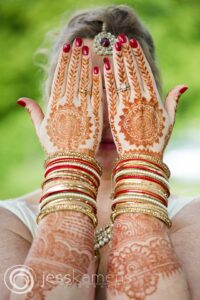Henna body art, also known as mehndi, has a 5,000-year-old history. For brides preparing for their big day, mehndi holds important cultural, social, and personal meaning.
Bharati Bhamare is a local henna artist whose detailed work has attracted Rochester brides for more than eight years. A graduate of the world-famous Ash Kumar Academy, she bases her intricate designs on traditional Indian and Arabic patterns while also incorporating the latest design trends. (585) asked Bhamare about her work as a henna artist and why it has a culturally special place in weddings.
What is the historical and cultural context of henna art?
The art of henna has been practiced in Pakistan, India,Africa, and the Middle East for more than 5,000 years. It was originally used for its natural cooling properties for people living in hot desert climates. A paste would be made, in which the palms of hands and soles of feet would soak.
Henna symbolizes good health and prosperity in marriage, and in some cultures, the darker the henna stain, the deeper the love between two individuals. Wedding tradition calls for a mehndi ceremony to be held the night before the wedding as a way of wishing the bride good health and prosperity as she makes her journey to marriage.
Why do you think people like to have henna at their weddings?
I believe that during the preparation for the wedding, the bride can get exhausted. So, the henna ceremony is a chance for the bride to relax.When I am done with a client and see the happiness on the bride’s face, that is the essence of henna.
What types of special art or symbols do you use for weddings?
For weddings, I mostly do whatever the bride wishes. Commonly used symbols are portraits of the bride and groom, lotus flowers, paisley designs, and mandala flowers. Each has its own special meaning.
What do you recommend for brides who want to have henna for their wedding?
First, brides should select a henna artist who uses natural henna, bonus points if they prepare it themselves. Next, I ask all my brides to do all their skincare activities forty-eight hours beforehand, so the exfoliation does not impact the henna color penetration. Finally, the henna should be applied at least two to three days before their wedding day. Henna takes at least twenty-four to forty-eight hours to truly come to its full color.
To contact Bhamare and learn more about henna visit hennabybharati.com.
Views: 1






